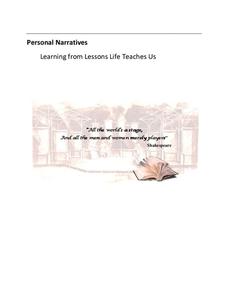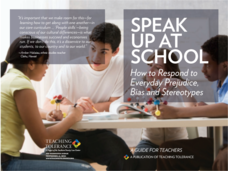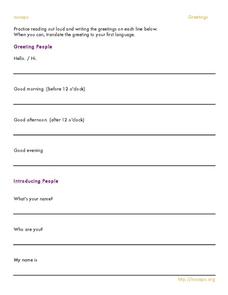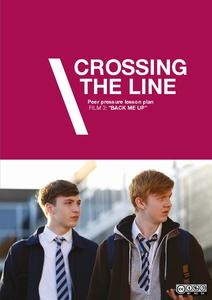J. Paul Getty Trust
O Greek Shape! O Fair Pose!
Everything old is new again. The Los Angeles J. Paul Getty Museum presents a lesson on how Greek black-figure painting influenced eighteenth century Neoclassical artists. After looking at a series of examples, class members create their...
Thoughtful Education Press
Personal Narratives: Learning from Lessons Life Teaches Us
"First Appearance," Mark Twain's tale about overcoming stage fright, serves as a model of a personal narrative and gets young writers thinking about milestones in their own lives. After examining student models and considering the...
J. Paul Getty Trust
Looking and Learning in the Art Museum — Lesson 2
Is there a difference between examining an original work of art and viewing a reproduction? Class members are asked to reflect on this question after researching a piece, study a reproduction of it, and the examining the original in an...
J. Paul Getty Trust
Looking and Learning in the Art Museum — Lesson 3
Curator, artist, art handler, archivist, conservator-restorer, guide. Who would have thought there were so many different kinds of museum professionals? After a visit to an art museum, class members reflect on the role of the museum in...
Nosapo
Getting to Know Each Other
How do you do? Guide learners through the basics of conversational English with an extensive set of discussion questions. Class members ask partners more about themselves, including their favorite hobbies, music, and time of day, as well...
National Library of Medicine
Your Environment, Your Health: The Great Debate—Bottled Water vs. Tap Water in Our School
Should bottled water be sold in schools, or should they only provide tap water? The summative unit in the six-part series encourages scholars debating this topic. The lessons teach how to build an argument, how to gain background...
Southern Poverty Law Center
Speak Up at School
When someone says something offensive based on prejudice or a stereotype, it's often difficult to know how to react. A packet on tolerance and standing up for others guides teachers to both learn and instruct members of their class to...
J. Paul Getty Trust
Picturing a Story: Photo Essay about a Community, Event or Issue
Picture this. Class members follow in the footsteps of W. Eugene Smith, Dorothea Lange, James Nachtwey, and Lewis Hine by creating their own photo essay about a local event or issue.
PBS
Stories of Painkiller Addiction: Commitment to Recovery
Recovery from substance addiction is an ongoing process. The final lesson plan in a series about painkiller abuse and addiction prompts learners to research various recovery options before writing a short story about a character who is...
PBS
Stories of Painkiller Addiction: Decisions and Consequences
Teach young learners that most drug addictions end in one of three outcomes: treatment, jail, or death. After watching a short video segment on the consequences of drug abuse, class members discuss what they viewed and consider what...
PBS
Stories of Painkiller Addiction: Prescription Drug Abuse Awareness Campaign
The I-STOP law was designed to regulate the distribution and tracking of prescription drugs. After reading an article about its signing and implementation, middle and high schoolers work together to come up with their own ideas for an...
PBS
Stories of Painkiller Addiction: Contemplating Nature vs. Nurture
Does having an addict in your family make it more likely to become one yourself? Explore the genetic risk factors, as well as the prominent environmental influences, for substance addiction in a lesson that encourages awareness and open...
Discovery Education
Our Brain and Body on Opioids
Use a presentation that explores the world of prescription opioids. Learners look at the way the brain responds to the drugs and the long terms effects opioids have on the brain and body. At the end of the lesson, groups create a social...
Nosapo
Greetings
Hi! How are you? Join the conversation with a straightforward exercise on English greetings. After translating common greetings into their first languages, class members practice greeting each other and note the appropriate responses.
Childnet International
Self Esteem
To middle schoolers, there's nothing worse than being excluded from a peer group. Developing important self-esteem skills can not only get them through awkward adolescent times, it can carry them through the rest of their lives as...
Childnet International
Peer Pressure
What do you do if someone you like wants you to do something you don't want to do? A series of activities, including discussion, videos, role-play, and poster projects, demonstrate the most effective ways to withstand peer pressure online.
Childnet International
Crossing the Line: Sexting
Technology may be changing every day, but peer pressure remains difficult for teenagers to resist. After watching a video about feeling pressured to text provocative pictures, middle schoolers learn about the laws and school policy...
Towson University
Mystery Tubes
How do scientists know they're right? Truth be told, they don't always know. Explore the scientific process using mystery tubes in an insightful activity. Young scientists discover how to approach and solve problems in science, how ideas...
Roald Dahl
Matilda - The New Home
Matilda finally gets her happy ending with a new home with Miss Honey. But first, Mr. Wormwood goes on trial for his wrong doings and bad car sales. Class members take on the role of a character in the trial and participate in a role...
Roald Dahl
Matilda - The First Miracle
As the story unfolds, readers discover Matilda has a superpower. Take part in an activity that has learners talking about what superpower they would have, how they would use it, and how it could help others. Then, after reading the 14th...
Roald Dahl
Matilda - The Weekly Test
Readers take the main characters in Matilda and individually describe them through a mnemonic. To get there, group members create an acrostic poem describing the character they were given, and choose one of the words from the acrostic...
Roald Dahl
Matilda - Bruce Bogtrotter and the Cake
After reading the 11th chapter in Matilda, class members take on the role of Bruce Bogtrotter and re-enact the cake eating scene. Here's the catch: they must come-up with an impromptu re-enactment of the scene from the story, and use...
Roald Dahl
Matilda - The Platinum-Blond Man
Before reading Chapter Six, "The Platinum-Blond Man" in Matilda, readers preview the illustration of Mrs. Wormwood dropping her plate of food, and think about what may have happened to cause the scene. After reading the chapter, class...
Roald Dahl
Matilda - Miss Trunchbull
How would you react to the Trunchbull if she was your teacher? This is the focus of an activity that has readers imagining and then acting out their reactions to various Trunchball scenarios in the story.

























